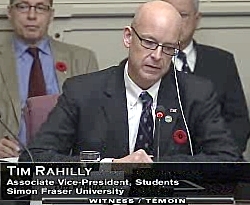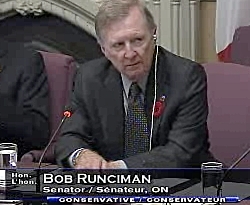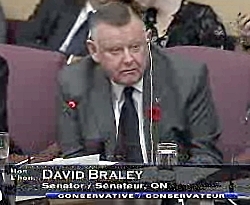 The two-month (and counting) National Hockey League lockout is being cited as the cause of brewer Molson Coors’ recent decline in sales, particularly in Canada. CEO Peter Swinburn told the Canadian Press that the social gatherings at which hockey and beer are consumed in equal quantities “have disappeared off the map and you just can’t replicate them.” Swinburn said Molson Coors would seek “redress” from the NHL as a result of the labor stoppage. “I can’t quantify that and I don’t know because I don’t know the scale of how long the lockout is going to last.”
The two-month (and counting) National Hockey League lockout is being cited as the cause of brewer Molson Coors’ recent decline in sales, particularly in Canada. CEO Peter Swinburn told the Canadian Press that the social gatherings at which hockey and beer are consumed in equal quantities “have disappeared off the map and you just can’t replicate them.” Swinburn said Molson Coors would seek “redress” from the NHL as a result of the labor stoppage. “I can’t quantify that and I don’t know because I don’t know the scale of how long the lockout is going to last.”
The labor strife (and bad weather in New York) also got blamed for the NHL’s last-minute decision to cancel the appearance of two of its high-profile representatives at the Standing Senate Committee for Legal and Constitutional Affairs’ final hearing on Canada’s C-290 single-game sports betting legislation. In lieu of human beings, the NHL sent a statement, which read in part:
“If single-game sports betting becomes a publicly fostered and sponsored institution, then the very nature of sports in North America will change, and we fear it will be changed for the worse. Such wagering poses perhaps the greatest threat to the integrity of our games, since it is far easier to engage in ‘match fixing’ in order to win single-game bets than it is in cases of parlay betting (as currently exists in Canada), where bets are determined on the basis of multiple game outcomes.”
 RAHILLY GIVES IT THE OLD COLLEGE TRY
RAHILLY GIVES IT THE OLD COLLEGE TRY
The NHL’s absence left the testifying up to Tim Rahilly, Associate Vice-President, Students at Simon Fraser University in British Columbia. Rahilly related his concerns that single-game sports betting would negatively impact Canadian universities’ ability to host National Collegiate Athletic Association competitions. SFU is the first non-American book-learnin’ facility to be granted full active NCAA membership, and the NCAA gets quite peevish regarding holding its championship games in jurisdictions that offer sports betting. As such, Rahilly says SFU’s athletes would lose home-field advantage in any future contests in which they might be good and/or lucky enough to participate. These teams would also incur extra travel expenses by having to play ‘home’ games away from home.
Rahilly said SFU had recently begun tracking gaming’s influence on its students, something Rahilly defined as “an emerging problem.” Rahilly claimed there was evidence to suggest university-age students preferred to bet with their friends rather than with online gambling sites, then paradoxically claimed that wider availability of sports betting options would result in more gambling. (Is Rahilly suggesting most students who bet on sports have friends who work for provincial lottery corporations?) When challenged on this point later, Rahilly doubled back, saying he had not seen any data on whether increased availability of gambling affected young adults and his statement was based on “observations” that were “in some cases, anecdotal.”
 RUNCIMAN TO THE RESCUE
RUNCIMAN TO THE RESCUE
Committee chairman Sen. Brian Runciman was first to grill Rahilly following his statement. When CalvinAyre.com spoke to Runciman a week ago, we told him about New England Patriots owner Robert Kraft’s statement that London, England deserved its own NFL franchise, a sentiment that stood in stark contrast to testimony from previous Committee witnesses that no league would expand into a jurisdiction in which single-game sports betting was permitted.
Runciman expressed great interest in learning this factoid, and indeed, it was the very first question he put to Rahilly. Runciman said he found it “curious and passing strange” that the leagues would express opposition to sports betting bills in Canada and New Jersey, “but when they see a dollar on the horizon, it’s not a problem.” Rahilly parried Runciman’s thrust by saying he was more familiar with educational bodies’ views on the subject, and while he conceded that the NFL’s contradiction was “strange,” he added that “large organizations like that often don’t speak with a single voice.”
Runciman went on to recount past NCAA point-shaving scandals and how most of these were brought to light via sportsbooks in Nevada reporting unusual betting activity, which Runciman cited as proof that legal, above-ground sports betting was the best defense against match-fixing and the like. Rahilly said he wasn’t aware of the NCAA having any info-sharing agreements with any sports betting outfits, which Runciman described as a “head in the sand” approach.
 COULD CANADA JAIL HALF ITS CITIZENS?
COULD CANADA JAIL HALF ITS CITIZENS?
Sen. David Braley stated a protectionist argument for C-290, suggesting the provincial lottery corporations needed to repatriate the billions of Canadian dollars currently going to international online gambling sites. (Braley singled out Bet365 as the recipient of one-quarter of the estimated $4b Canadians currently wager online.) Rahilly retorted by wondering why, if something was illegal, were the authorities not stopping it. Braley responded in kind, revealing that he’d conducted a poll of his own staffers and found 56% of them currently wagered online with international operators. “Are you going to put 56% of the population in jail?” Rahilly admitted that such a prospect would ‘concern” him.
Sen. Linda Frum, a self-described “mother of a student-athlete,” brought up the potentially “dangerous, corrosive” effect of having student athletes comingling with student bettors. Rahilly said he could offer only “conjecture based on my experiences,” saying the effect – if any – was unknown. Nonetheless, Rahilly described this comingling as a “huge concern on the part of amateur sport because it would be very difficult to detect,” quickly adding that he wasn’t sure whether that would be the case if the info-sharing agreements Runciman referenced earlier were established.
Sen. Paul E. McIntyre attempted to lob Rahilly a softball regarding gambling’s potential ability to add to the wear and tear that school puts on a student’s psychological and emotional state, and Rahilly somehow managed to put on the record that “going to school is very hard and in many ways is not good for you, in terms of your mental well-being.” We eagerly await bill C-291, the Abolish Higher Education To Save Our Children Act.
ENDGAME
With just one witness appearing, the hearing wrapped up after a little more than an hour. It was not in the Committee’s power to kill the bill, so the meeting ended the only way it could, with the Committee agreeing to send C-290 back to the Senate floor for a third and final reading and – at long last – a deciding vote. We attempted to contact Sen. Runciman to hear what questions he would have posed to the NHL reps had they deigned to show, but he had already left Ottawa to attend a previously scheduled event. Runciman previously told us that the Senate’s third hearing on the bill would likely commence the week of the 19th and that the vote, which might not take place until December, could be a nail-biter. Watch this space…